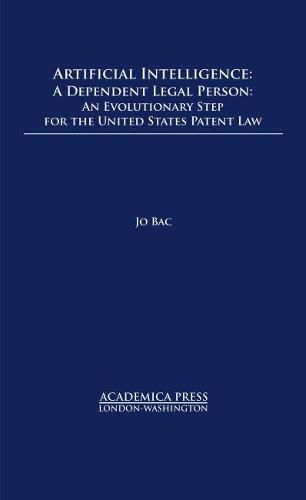Readings Newsletter
Become a Readings Member to make your shopping experience even easier.
Sign in or sign up for free!
You’re not far away from qualifying for FREE standard shipping within Australia
You’ve qualified for FREE standard shipping within Australia
The cart is loading…






Jo Bac’s groundbreaking legal study asks why and how the United States legal system should grant legal personhood to artificial intelligence (AI). This new legal status of AI is visualized as a dependent person, and the AI dependent legal person would be determined by an inextricable connection between AI and a new type of corporate body, introduced here as AI-Human Amalgamation (AI-HA).
Artificial Intelligence has been defined as one or more computer programs with an ability to create work that is unforeseen by humans. This includes AI capacity to generate unforeseen innovations, patentable inventions, and/or infringe the rights of other patent holders. At present, AI is an entity unrecognized by law. The fact that AI is neither a natural nor a legal person indicates that it cannot be considered the owner of rights or bearer of liabilities. This in turn creates tension both in society and legal systems because questions such as who should hold the rights of AI or be liable for autonomous acts of AI remain unanswered.
This book dynamically argues that the AI dependent legal person and AI-HA are necessary to address these new challenges. The creativity and actions of AI and AI-HA would be distinct from those performed by human beings involved in the creation of this amalgamation, such as AI’s operators or programmers. As such, this structure would constitute an amalgamation based on human beings and AI cooperation (AI-HA). As a dependent legal person, AI would hold the patent rights to its own inventions, thus ensuring favorable conditions for the incentives of the U.S. patent system. In addition, the proposed legal framework with the use of legislative instruments could address any liability concerns arising from foreseen and unforeseen actions, omissions, and AI’s failure to act.
$9.00 standard shipping within Australia
FREE standard shipping within Australia for orders over $100.00
Express & International shipping calculated at checkout
Jo Bac’s groundbreaking legal study asks why and how the United States legal system should grant legal personhood to artificial intelligence (AI). This new legal status of AI is visualized as a dependent person, and the AI dependent legal person would be determined by an inextricable connection between AI and a new type of corporate body, introduced here as AI-Human Amalgamation (AI-HA).
Artificial Intelligence has been defined as one or more computer programs with an ability to create work that is unforeseen by humans. This includes AI capacity to generate unforeseen innovations, patentable inventions, and/or infringe the rights of other patent holders. At present, AI is an entity unrecognized by law. The fact that AI is neither a natural nor a legal person indicates that it cannot be considered the owner of rights or bearer of liabilities. This in turn creates tension both in society and legal systems because questions such as who should hold the rights of AI or be liable for autonomous acts of AI remain unanswered.
This book dynamically argues that the AI dependent legal person and AI-HA are necessary to address these new challenges. The creativity and actions of AI and AI-HA would be distinct from those performed by human beings involved in the creation of this amalgamation, such as AI’s operators or programmers. As such, this structure would constitute an amalgamation based on human beings and AI cooperation (AI-HA). As a dependent legal person, AI would hold the patent rights to its own inventions, thus ensuring favorable conditions for the incentives of the U.S. patent system. In addition, the proposed legal framework with the use of legislative instruments could address any liability concerns arising from foreseen and unforeseen actions, omissions, and AI’s failure to act.